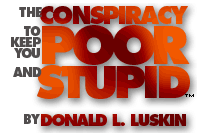Posthumous Nobel awarded to Krugman
Where do great economists go when their career is finished? Most to the grave - they do distinguished work all their lives.
But not Paul Krugman. After a few decades of break-through work on the importance of international trade he set his accomplishments aside to be the lead attacker for the left. Week after week he tore into every center-right position and person, not with facts and humour, but with acid and misleading.
But surely when international trade was under attack he applied his distinguished work to cool the isolationists? No. When during the Democrat debates every candidate renounced North American Free Trade Agreement he was silent. The great economist had ended his work and changed careers. He has been a hack for years. And unaccountable for his errors until the stench grew so strong that even the liberal New York Times had to pull him back a bit.
Professor Krugman deserves the Nobel prize for economics. But what happened to the distinguished professor? How did he turn into the liberal hack?
Donald Luskin figured it out. Professor Krugman "died."
 The Conspiracy to Keep You Poor and Stupid:
The Conspiracy to Keep You Poor and Stupid:Prior to 2008 the Nobel Prize had never been awarded posthumously. So great minds such as John Maynard Keynes and Fischer Black never received the coveted award. But all that has changed. This year, the prize for economics is going to Paul Krugman, an economist who died a decade ago.A Big Lie
To clarify, the person named Paul Krugman, the living and breathing man who will accept the Nobel in Stockholm this December, is merely a public intellectual — a person operating in the same domain as, say, Oprah Winfrey.
The living Krugman’s rabidly liberal New York Times column has, for nine years now, traded on the dead Krugman’s reputation as an economist, a reputation that only will be burnished by the award of the Nobel Prize. Yet his column is pure politics, not economics. It is the equivalent of astronomers Mather and Smoot — the 2006 Nobelists in physics — writing on astrology.
This living Paul Krugman can’t be the same person as the dead economist. The dead economist wrote eloquently of the supreme importance of globalization and international trade as engines of prosperity. But the living public intellectual remains silent on these subjects when the Democratic party’s nominee for president threatens to abrogate the North American Free Trade Agreement.
These days Krugman’s liberal agenda always takes precedence over economic principle. He has described himself as “an unabashed defender of the welfare state.” He has declared, “For me, Sweden of 1980 would be ideal.” He has called Barack Obama’s sweeping plan for socialized medicine “naïve” because it doesn’t contain enough mandates. He has said that “We should be getting 28% of GDP in [tax] revenue,” when the highest level ever collected, even in wartime, is less than 21 percent.
Krugman is entitled to such opinions, whether as a public intellectual or an economist. But there have been serious questions about his journalistic integrity — suggestions that the living Krugman has debased and corrupted the very science the dead Krugman did so much to advance.
In 1999 Paul Krugman was paid $50,000 by Enron as a consultant on its “advisory board,” and that same year he wrote a glowing article about Enron for Fortune magazine. But he would change his tune. After Enron collapsed in 2001, Krugman wrote several columns excoriating the company. (One featured what may be the most absurd howler in the history of op-ed journalism: “I predict that in the years ahead Enron, not Sept. 11, will come to be seen as the greater turning point in U.S. society.”) In most of these columns Krugman worked hard to link Enron to the Bush administration, and in one he actually blamed Enron’s consultants for the company’s collapse — while neglecting to mention that he, too, had been an Enron consultant.Caught and tamed!
Daniel Okrent, while ombudsman for the New York Times, wrote that “Paul Krugman has the disturbing habit of shaping, slicing and selectively citing numbers.” Indeed. But Krugman’s distortions were so rampant, and his unwillingness to correct them so intransigent, that Okrent — no doubt pressured into service by my Krugman Truth Squad column for NRO — did something about it. Okrent forced the Times op-ed page to adopt for the first time a corrections policy for op-ed columnists. That was in 2004. Later, when Krugman flouted that policy, the Krugman Truth Squad went to work on Okrent’s successor, Byron Calame, who pressed for the adoption of a new, more stringent policy in 2005.


0 Comments:
Post a Comment
<< Home